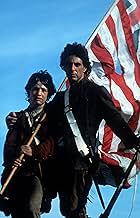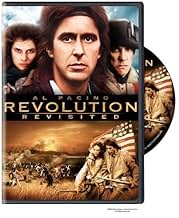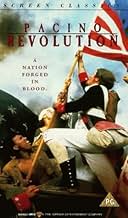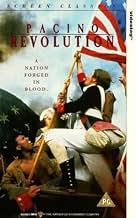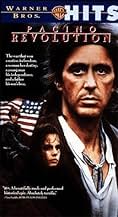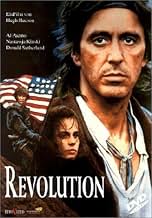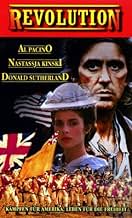AVALIAÇÃO DA IMDb
5,3/10
8 mil
SUA AVALIAÇÃO
Um caçador e seu filho pequeno são atraídos para a revolução americana logo no início, como participantes relutantes, e permanecem envolvidos até o fim.Um caçador e seu filho pequeno são atraídos para a revolução americana logo no início, como participantes relutantes, e permanecem envolvidos até o fim.Um caçador e seu filho pequeno são atraídos para a revolução americana logo no início, como participantes relutantes, e permanecem envolvidos até o fim.
- Prêmios
- 1 vitória e 4 indicações no total
Cheryl Anne Miller
- Cuffy
- (as Cheryl Miller)
Avaliações em destaque
Searching for some short-length used videotapes, I found the laserdisc version of "Revolution," which I'd never seen. This non-letterbox, TV format version had the usual "talking to air" problem with 2.35:1 movies. Although a scratch and miscellaneous dirt made the picture skip/repeat/wobble, it was an interesting foxhole-level look at the American Revolution. The scenery, set design, costumes, and varied kinds of people made me think that this was Sergio Leone's take on The War for Independence. Was Al Pacino believable as a backwoods English colonist? No, but like a scratch running through a film, the "speech impediment" is overlooked as the tale unfolds. This film, unlike "The Patriot," shows camp followers, Indians on both sides, fighting women, "Not Worth a Continental" issues, lots of dirt and the conventions and results of 18th century warfare. Valley Forge isn't as grim an encampment as paintings and written records reported, but it's a close miss for the English countryside location. Are the characters believable? Hard to tell, since their histories and motives aren't complete. (Having the action jump place to place with jumps in time make this a "fill-in-the-missing-backstory" exercise found in James Clavell's book "Nobel House" series.) Is it an interesting movie? Definitely, and has that 18th century "fleas, dirt, and grease" look that is missing from "The Patriot." 7/10, for presenting issues and motives that turned English colonists into Americans.
Many of the bad reviews of Revolution point out that it is dirty, filthy, disgusting, muddy, messy and uncomfortable to watch. True, true, true.
But... THAT'S WAR!
As a child I thought the American Revolution was the cleanest and most honerable war in history, fought by idyllic patriots on the side of freedom against snooty, smug king-lovers. That's how it was depicted in my childhood history books. But as I got older I realized that the books must have been glossing over something, because it seemed utterly illogical that a war could be so clean and honerable. Wars are desperate and horrible blood-soaked experiences that rip relationships apart, destroy everything, and are fought at ground level by the most uneducated people of all, many of whom really have no choice in the matter and are merely fighting for their own lives.
Revolution demythologizes the American Revolution by dismissing many of the ideal illusions we have about that war in particular. The hero is a self-serving man, who has no interest at all in war, but is forced to fight in it against his will. He's a free man who is forced into virtual slavery to fight for his freedom. Does this make him a bad man? No, he's an honest man who is out for number one, and is motivated mostly by love and loyalty to his son. The war steals everything from him, so why should he be happy about it? There are a few true 'patriots' in this movie, gung-ho idealists like Daisy, but almost everyone else is in the war for selfish motives, to profit from the war, to assert power, to avoid starvation, or for the pure joy of war itself. The redcoats are depicted as rowdy london street-toughs, who are no more or less ignorant & petty than the Americans, only more cocky and egotistical. Their uniforms are ill fitting and poorly miantained. This and a thousand other details give this movie the air of truth. By the end the victory of America is all the more sweet due to the wretchedness the victors must slog through. It's a very noble thing to see war depicted in such realistic ways.
This movie might be too grim to take if not for the great love story at the center of it. Its an entirely unique love story in the history of film, because it demonstrates how a relationship can continue to grow over time even if the lovers are separated from each other for long periods. Daisy and Tom have only a few minutes worth of conversations in the entire movie, and those represent ALL of their conversations. Basically they cross paths from time to time, but they are interrupted every time, and must leave each other, unsure when or if they will ever see each other again. So although they don't really get to know each other or go on dates or have any kind of normal courtship, they nonetheless fall in love, basically thinking about each other over the intervening periods. It is really the war that allows them to fall in love in the first place. Without the war these two people from opposite sides of the social spectrum would never have socialized, and without American freedom they would never have been able to stay together. But in the throes of war all the social rules are off, and these two are so desperate for something good to enter their lives, they fall in love. I don't know why this touched me so much, but it did.
I find this movie emminently re-watchable. I love it. In comparison, Mel Gibson's bad rip-off "the Patriot" is unwatchable to me. It is so full of moral absolutes and is so organized and visually beautiful, I think it does a disservice to the reality of war.
But that's my taste. I love almost every grim-reality war movie. Catch 22, The Victors & Das Boot, to name a few.
But... THAT'S WAR!
As a child I thought the American Revolution was the cleanest and most honerable war in history, fought by idyllic patriots on the side of freedom against snooty, smug king-lovers. That's how it was depicted in my childhood history books. But as I got older I realized that the books must have been glossing over something, because it seemed utterly illogical that a war could be so clean and honerable. Wars are desperate and horrible blood-soaked experiences that rip relationships apart, destroy everything, and are fought at ground level by the most uneducated people of all, many of whom really have no choice in the matter and are merely fighting for their own lives.
Revolution demythologizes the American Revolution by dismissing many of the ideal illusions we have about that war in particular. The hero is a self-serving man, who has no interest at all in war, but is forced to fight in it against his will. He's a free man who is forced into virtual slavery to fight for his freedom. Does this make him a bad man? No, he's an honest man who is out for number one, and is motivated mostly by love and loyalty to his son. The war steals everything from him, so why should he be happy about it? There are a few true 'patriots' in this movie, gung-ho idealists like Daisy, but almost everyone else is in the war for selfish motives, to profit from the war, to assert power, to avoid starvation, or for the pure joy of war itself. The redcoats are depicted as rowdy london street-toughs, who are no more or less ignorant & petty than the Americans, only more cocky and egotistical. Their uniforms are ill fitting and poorly miantained. This and a thousand other details give this movie the air of truth. By the end the victory of America is all the more sweet due to the wretchedness the victors must slog through. It's a very noble thing to see war depicted in such realistic ways.
This movie might be too grim to take if not for the great love story at the center of it. Its an entirely unique love story in the history of film, because it demonstrates how a relationship can continue to grow over time even if the lovers are separated from each other for long periods. Daisy and Tom have only a few minutes worth of conversations in the entire movie, and those represent ALL of their conversations. Basically they cross paths from time to time, but they are interrupted every time, and must leave each other, unsure when or if they will ever see each other again. So although they don't really get to know each other or go on dates or have any kind of normal courtship, they nonetheless fall in love, basically thinking about each other over the intervening periods. It is really the war that allows them to fall in love in the first place. Without the war these two people from opposite sides of the social spectrum would never have socialized, and without American freedom they would never have been able to stay together. But in the throes of war all the social rules are off, and these two are so desperate for something good to enter their lives, they fall in love. I don't know why this touched me so much, but it did.
I find this movie emminently re-watchable. I love it. In comparison, Mel Gibson's bad rip-off "the Patriot" is unwatchable to me. It is so full of moral absolutes and is so organized and visually beautiful, I think it does a disservice to the reality of war.
But that's my taste. I love almost every grim-reality war movie. Catch 22, The Victors & Das Boot, to name a few.
After the Academy Awards, the most important awards ceremony is the Golden Raspberries (known as "Razzies") – the "worst of" counterpart to the Oscars. The thing about the Razzies is that they don't go for the literal worst movies of the year – otherwise they would give prizes to a load of trashy B-movies. Instead they bestow their honours upon the high profile flops, the movies that could have been so much more, the casts and crews who should have known better. Revolution stars Al Pacino, one of the greatest actors of his generation, and was directed by Hugh Hudson, he of 1981 Best Picture Chariots of Fire. And yet, in a stark "Oh how the mighty have fallen" scenario, it recouped less than two percent of its budget at the box office and was nominated for four Golden Raspberries.
Revolution is not without promise. In contrast to the usual gung-ho attitude of pictures on this subject (cf. The Patriot), this takes an approach rare in historical pictures on any era, showing not the makers and shapers of change, but those unwillingly caught up in it. The Robert Dillon screenplay still ultimately comes down on the side of the revolutionaries, but it shows the conflict with the minimum of political emotiveness, and a storyline whose occasional poignancy comes from its even-handed intimacy. Director Hudson has excelled in creating tableaux that are full of believable bustle and period dirt, even if they were entirely shot in rainy England. There's a realistic melange of accents to be heard here; not just clipped British and broad American, which didn't really exist in any recognisable form at the time anyway. The credibility of some of the bit parts is very effective, such as the bolshy soldier who prods Pacino when he's chosen for the fox hunt, a slappable face if ever there was one.
And yet the movie's the biggest flaws are on the same grounds. There are some woefully unrealistic and downright silly characterisations here. Chief among these is Nastassja Kinski's. While no means badly acted (in fact she does very well all things considered), the character as written is in no way believable. Not that you can't have rebellious and resourceful women, but stabbing a man in the nadgers at a soirée is a bit hard to swallow. It would probably have warranted her a stint in an asylum, and certainly more than just a telling off from her mother. And giving the Englishman in question a stupid nasal voice and cartoonish demeanour was a huge mistake. It all seems totally at odds with the realism elsewhere in the movie. There are problems too with the over-earnest attempt at a documentary look. Hudson's constant use of hand-held camera quickly becomes tiresome. Pacino's performance is heartfelt but there are times when he appears to break into improvisation yet comes across too much as the modern New Yorker.
In response to its poor reception, Hudson would later revisit the material for a 2009 special edition appropriately titled Revolution Revisited, and it is this version of the movie which I have seen. Apparently around ten minutes of footage was shorn off (I don't know what this was so can't comment), and they added narration by Pacino, written and recorded ad hoc. This latter was to my mind a mistake – it adds nothing, basically spelling out the character's thoughts at any given moment, even though the essence of them is already there on the screen. It somewhat spoils the taciturn moodiness of the character, as well as the chaotic wordlessness of some scenes. It's nice however to be able to enjoy a decent new transfer of the picture, because it really isn't as bad as its reputation (and those Razzie nominations, all of which it lost to Rambo II, I hasten to add) would suggest. It is incredibly moving at times, a high point being Pacino's desperate comforting of Ned as his foot wound is cauterized. It's also beautifully shot. This is ultimately a movie of two sides – the very good and the very bad, with no middle ground of mediocrity. And this is very frustrating, because you can see just how easily it could have been a masterpiece.
Revolution is not without promise. In contrast to the usual gung-ho attitude of pictures on this subject (cf. The Patriot), this takes an approach rare in historical pictures on any era, showing not the makers and shapers of change, but those unwillingly caught up in it. The Robert Dillon screenplay still ultimately comes down on the side of the revolutionaries, but it shows the conflict with the minimum of political emotiveness, and a storyline whose occasional poignancy comes from its even-handed intimacy. Director Hudson has excelled in creating tableaux that are full of believable bustle and period dirt, even if they were entirely shot in rainy England. There's a realistic melange of accents to be heard here; not just clipped British and broad American, which didn't really exist in any recognisable form at the time anyway. The credibility of some of the bit parts is very effective, such as the bolshy soldier who prods Pacino when he's chosen for the fox hunt, a slappable face if ever there was one.
And yet the movie's the biggest flaws are on the same grounds. There are some woefully unrealistic and downright silly characterisations here. Chief among these is Nastassja Kinski's. While no means badly acted (in fact she does very well all things considered), the character as written is in no way believable. Not that you can't have rebellious and resourceful women, but stabbing a man in the nadgers at a soirée is a bit hard to swallow. It would probably have warranted her a stint in an asylum, and certainly more than just a telling off from her mother. And giving the Englishman in question a stupid nasal voice and cartoonish demeanour was a huge mistake. It all seems totally at odds with the realism elsewhere in the movie. There are problems too with the over-earnest attempt at a documentary look. Hudson's constant use of hand-held camera quickly becomes tiresome. Pacino's performance is heartfelt but there are times when he appears to break into improvisation yet comes across too much as the modern New Yorker.
In response to its poor reception, Hudson would later revisit the material for a 2009 special edition appropriately titled Revolution Revisited, and it is this version of the movie which I have seen. Apparently around ten minutes of footage was shorn off (I don't know what this was so can't comment), and they added narration by Pacino, written and recorded ad hoc. This latter was to my mind a mistake – it adds nothing, basically spelling out the character's thoughts at any given moment, even though the essence of them is already there on the screen. It somewhat spoils the taciturn moodiness of the character, as well as the chaotic wordlessness of some scenes. It's nice however to be able to enjoy a decent new transfer of the picture, because it really isn't as bad as its reputation (and those Razzie nominations, all of which it lost to Rambo II, I hasten to add) would suggest. It is incredibly moving at times, a high point being Pacino's desperate comforting of Ned as his foot wound is cauterized. It's also beautifully shot. This is ultimately a movie of two sides – the very good and the very bad, with no middle ground of mediocrity. And this is very frustrating, because you can see just how easily it could have been a masterpiece.
I've just seen "Revolution" on TV and I have to say that it's a much better movie than one may think. Sometimes a movie is worth-seeing only because of its wonderful production values. And "Revolution" is an eye-popping visual feat: wonderful cinematography, first-rate period details. I might say that beside Stanley Kubrick's "Barry Lyndon" and Tony Richardson's "Tom Jones", this is the most beautifully made period movie about the eighteenth century. "Revolution" is also an important film because there are only about a dozen films on the Revolutionary War and almost all of them are a matter of obscurity - at least for a Hungarian movie lover. The most popular is Roland Emmerich's "The Patriot" (2000). In my opinion that's a much worse film than Hudson's maligned film. When "Revolution" was released it was a critical and commercial disaster. I think it didn't fit in any of the movie trends of the 1980s. But in the future it might be regarded as a flawed but valuable movie. Its flaws are obvious and much-discussed so I don't want to speak about them. If you're interested in beautiful period pieces and the Revolutionary War you might like this movie.
This movie has consistantly been trashed by numerous professional and amateur reviewers alike. Even Leonard Maltin, my personal favorite movie guy, rated it a "BOMB". I can`t understand why. Although it isn`t a perfect film endeavor, it does tell a story that`s never been told before...but obviously in a manner that many found extremely annoying at best. Aside from New York and L.A. movie houses, I don`t believe this film was released nationally at any time. Personally, I thought it was a very different type of movie, but effective and entertaining in a strange way. It gave me a feel for the time period, including an appealing atmospheric identity. Being an ex-NewYorker and exposed to the famous Revolutionary battlefields, that still exist throughout the metro area, I felt an aura of actually being present in that time period, with events occuring on both surrealistic and realistic levels. Al Pacino is a born/raised New Yorker and I believe captured the essence of his character very well. Pacino gave a solid portrayal of an 18th. century individual caught up in a violent period of American history. This movie has been unfairly criticized and overly maligned in my humble opinion. A unique film deserving of more praise then it has been awarded. See it for yourself.
--------------------------------------------------------------------------- -----
--------------------------------------------------------------------------- -----
Você sabia?
- CuriosidadesUpon its release, this movie was the biggest box-office disaster in British movie history. It scared off city financing for British movies for years, almost single-handedly causing a decade-long financial crisis in the industry.
- Erros de gravaçãoIn battle, the British soldiers are depicted taking short steps; in reality, Redcoats were trained to take long paces, so as to close the range quickly.
- Versões alternativasIn 2009, Hugh Hudson made his own director's cut titled "Revolution Revisited" which was also released on DVD. The new version featured new narration recorded by Al Pacino, a different ending, and removed 10 minutes of footage from the film.
- ConexõesEdited into Give Me Your Answer True (1987)
Principais escolhas
Faça login para avaliar e ver a lista de recomendações personalizadas
- How long is Revolution?Fornecido pela Alexa
Detalhes
- Data de lançamento
- Países de origem
- Idioma
- Também conhecido como
- Revolution
- Locações de filme
- King's Lynn, Norfolk, Inglaterra, Reino Unido(New York scenes)
- Empresas de produção
- Consulte mais créditos da empresa na IMDbPro
Bilheteria
- Orçamento
- US$ 28.000.000 (estimativa)
- Faturamento bruto nos EUA e Canadá
- US$ 358.574
- Fim de semana de estreia nos EUA e Canadá
- US$ 52.755
- 29 de dez. de 1985
- Faturamento bruto mundial
- US$ 358.574
- Tempo de duração
- 2 h 6 min(126 min)
- Cor
- Proporção
- 2.35 : 1
Contribua para esta página
Sugerir uma alteração ou adicionar conteúdo ausente


